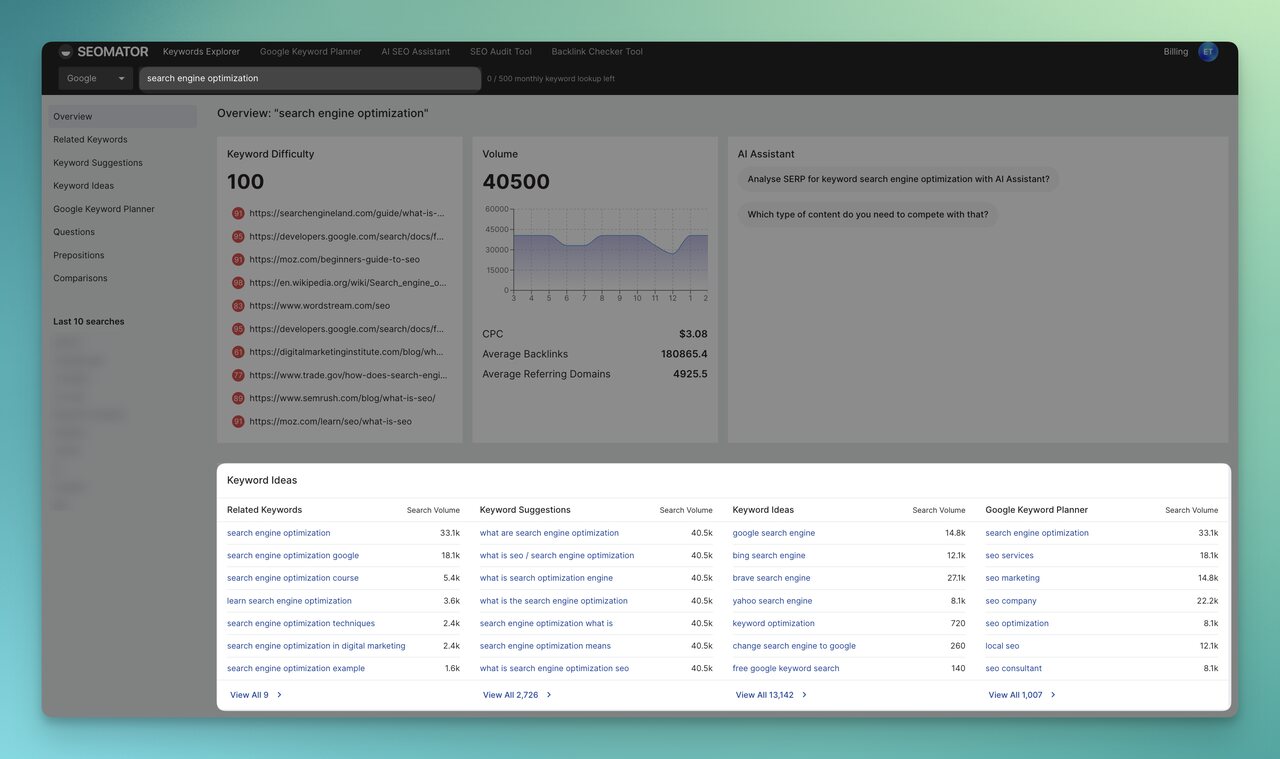
An SEO audit for law firms is a systematic review of your website's search performance across six areas: keyword targeting, on-page optimization, technical health, local SEO, backlink quality, and competitor positioning. According to SeoProfy, organic search generates 53% of law firm website visitors and SEO leads convert at 14.6%, making regular audits essential for any firm seeking consistent client acquisition online.
Why Should Law Firms Conduct Regular SEO Audits?
According to Attorney at Work, 87% of people use Google to decide which law firm to hire in 2025. With that level of search dependency, your website's visibility directly impacts your client pipeline.

Here are the core benefits of running a structured SEO audit for your law firm:
| Benefit | What It Reveals | Business Impact |
|---|---|---|
| Penalty Prevention | Black-hat tactics, thin content, or technical errors that trigger search engine penalties | Protects your rankings from sudden drops |
| Traffic Analysis | Which channels (organic, referral, social, direct) drive qualified visitors | Helps allocate marketing budget effectively |
| Keyword Performance | Which practice-area keywords rank well and which underperform | Focuses content efforts on high-intent terms |
| Competitive Intelligence | How rival firms rank, what content they publish, and their backlink profiles | Identifies gaps and opportunities in your market |
| Local Visibility | Google Business Profile accuracy, citation consistency, and local pack positioning | Captures "near me" searches that grew 900% in recent years |
| Action Plan | Prioritized list of fixes ranked by effort and expected impact | Turns audit findings into measurable improvements |
According to MyCase, 45% of legal marketing budgets go toward SEO, and law firms spend an average of $120,000 per year on search optimization. A thorough audit ensures that investment delivers measurable returns rather than wasted spend.
How Do You Conduct an SEO Audit for a Law Firm in 6 Steps?
A complete law firm SEO audit covers six interconnected areas. Skipping any one area leaves blind spots that competitors can exploit. Here is the step-by-step process we use when auditing legal websites.
Step 1: Research Practice-Area Keywords
Start by identifying the keywords potential clients type when searching for legal help. Focus on three categories:
- Practice-area terms: "personal injury lawyer," "family law attorney," "criminal defense lawyer [city]"
- Intent-based queries: "how to file for divorce in [state]," "what to do after a car accident"
- Competitor gaps: keywords rival firms rank for that your site does not target yet
Understanding search intent behind each keyword is critical. A person searching "best divorce lawyer near me" has buying intent, while someone searching "how does child custody work" needs informational content. Your site should address both.
SEOmator's Keyword Research Tool helps you discover high-volume, low-competition keywords specific to your practice areas. Sign up to the SEOmator dashboard for detailed keyword gap analysis against your direct competitors.

Step 2: Audit On-Page SEO Elements
On-page SEO determines how well search engines understand your content. Check these elements on every key page:
- Title tags: Include primary keyword + location + firm name (under 60 characters)
- Meta descriptions: Write compelling summaries with a call to action (under 160 characters)
- Header structure: Use one H1 per page, H2s for sections, H3s for subsections
- Content quality: Ensure practice-area pages answer common client questions thoroughly
- Internal linking: Connect related pages (e.g., link your "personal injury" page to your "car accident" page)
According to On The Map, 76% of people leave a law firm website if it does not provide enough information about the firm. Thin content on practice-area pages is one of the most common SEO mistakes law firms make.
Use SEOmator's Internal Link Checker to analyze your linking structure and find pages that lack internal connections.

Step 3: Run a Technical SEO Check
Technical issues prevent search engines from crawling and indexing your pages properly. Run these checks:
- Site speed: Target under 2.5 seconds for Largest Contentful Paint (LCP). According to On The Map, 69% of visitors abandon a law firm website that loads slowly.
- Mobile responsiveness: According to Clio, 23% of potential clients use mobile devices exclusively to find an attorney.
- HTTPS security: Confirm your entire site runs on HTTPS with a valid SSL certificate.
- Clean URLs: Use descriptive, keyword-rich URLs (e.g., /personal-injury-lawyer-chicago, not /page?id=123).
- Sitemap and robots.txt: Verify your XML sitemap is current and submitted to Google Search Console.
- Core Web Vitals: Check LCP, FID (under 100ms), and CLS (under 0.1) in Google PageSpeed Insights.
Test your website speed with SEOmator's Free Website Speed Test to identify specific bottlenecks like uncompressed images or render-blocking scripts.
Step 4: Evaluate Local SEO Performance
For law firms, local SEO often drives the highest-converting traffic. According to Grow Law, law firms appearing in local packs capture about 44% of user clicks, and 75% of users only engage with the top three results.
Check these local SEO factors:
- Google Business Profile: Claim, verify, and fully optimize your Google Business Profile with accurate hours, photos, practice areas, and regular posts.
- NAP consistency: Verify your Name, Address, and Phone number match exactly across your website, Google Business Profile, Yelp, Avvo, FindLaw, and all legal directories.
- Local citations: Build listings on legal-specific directories (Avvo, Justia, FindLaw, Martindale-Hubbell) and general directories (Yelp, BBB).
- Review management: According to Andava, 80% of potential clients research attorney reviews online, and 47% will not consider a firm with less than a 4-star rating.
Step 5: Analyze Your Backlink Profile
Backlinks remain one of the strongest ranking factors. For law firms, quality matters far more than quantity. Focus on:
- Link quality: Links from legal directories, bar associations, local news sites, and university .edu pages carry significant authority.
- Anchor text distribution: Ensure a natural mix of branded, keyword-rich, and generic anchor text.
- Toxic link identification: Find and disavow spammy or irrelevant backlinks that could trigger penalties.
- Competitor link gaps: Identify authoritative sites linking to competing firms but not to yours.
Step 6: Benchmark Against Competitors

A competitor analysis reveals what strategies work in your specific legal market. Compare your firm against the top 3-5 ranking competitors for your primary practice-area keywords:
- Content gaps: What topics do competitors cover that you do not?
- Backlink sources: Which authoritative sites link to them but not to you?
- Keyword overlap: Where do you compete for the same terms, and where can you find uncontested keywords?
- Page structure: How do their practice-area pages differ from yours in depth, format, and user experience?
How Do You Measure Whether Your Law Firm SEO Efforts Are Working?
After completing your audit and implementing changes, track these five metrics monthly to measure progress:
| Metric | What to Track | Target Benchmark |
|---|---|---|
| Keyword Rankings | Positions for practice-area keywords in Google Search Console | Top 10 for primary terms within 6-12 months |
| Organic Traffic | Monthly visitors from organic search in Google Analytics | 10-20% quarter-over-quarter growth |
| Lead Generation | Form submissions, phone calls, and chat inquiries from organic visitors | Steady increase aligned with traffic growth |
| Conversion Rate | Percentage of organic visitors who become leads | 7.5% or higher (industry average per SeoProfy) |
| Local Pack Visibility | Appearance in Google Maps 3-pack for "[practice area] lawyer [city]" searches | Consistent top-3 placement for primary service areas |
Set up a monthly reporting cadence. SEO results compound over time, and most law firms see meaningful ranking improvements within 3-6 months of implementing audit recommendations.
Key Takeaways
- Organic search drives 53% of law firm website traffic and converts at 14.6%, making SEO the highest-ROI marketing channel for legal practices.
- 87% of potential clients use Google to choose a law firm, so your search visibility directly determines your client pipeline.
- A complete law firm SEO audit covers six areas: keywords, on-page elements, technical health, local SEO, backlinks, and competitor analysis.
- Local SEO is especially critical: firms in the local 3-pack capture 44% of clicks, and 47% of clients reject firms with sub-4-star ratings.
- Track keyword rankings, organic traffic, leads, conversion rates, and local pack visibility monthly to measure progress.
- Law firms spend an average of $120,000 per year on SEO. Regular audits ensure that investment translates into qualified leads.
Related Articles
- DIY SEO for Small Businesses: 7 Easy Steps
- How to Recover Your SEO Rankings in 9 Steps
- How to Do SEO Yourself: 8 DIY SEO Tips
- SEO Audit Guide for Charities and Nonprofits
- SEO Audits: Statistical Breakdown and Analysis
Frequently Asked Questions
How often should a law firm run an SEO audit?
Run a comprehensive SEO audit at least twice per year, with quarterly checks on critical metrics like Core Web Vitals, local pack rankings, and backlink health. Google makes thousands of algorithm changes annually, and regular audits help you adapt before rankings drop.
How much does an SEO audit cost for a law firm?
A professional SEO audit for a law firm typically costs between $2,000 and $10,000 depending on site size and complexity. You can reduce costs by using tools like SEOmator to run initial audits yourself and then hiring specialists for advanced technical fixes.
What are the most common SEO mistakes law firms make?
The three most frequent mistakes are thin practice-area pages with fewer than 500 words, inconsistent NAP information across directories, and neglecting Google Business Profile optimization. Each of these directly impacts local search visibility where most legal clients begin their search.
Can a small law firm compete with large firms in SEO?
Small firms can absolutely compete by focusing on specific practice areas and geographic locations. A solo family law attorney targeting "divorce lawyer in [small city]" faces far less competition than a large firm targeting broad national terms. Local SEO and niche content are great equalizers.
How long does it take to see results from a law firm SEO audit?
Technical fixes like site speed improvements and meta tag optimization can show results within 2-4 weeks. Content and backlink improvements typically take 3-6 months to impact rankings significantly. Local SEO changes to your Google Business Profile can improve local pack visibility within 4-8 weeks.





